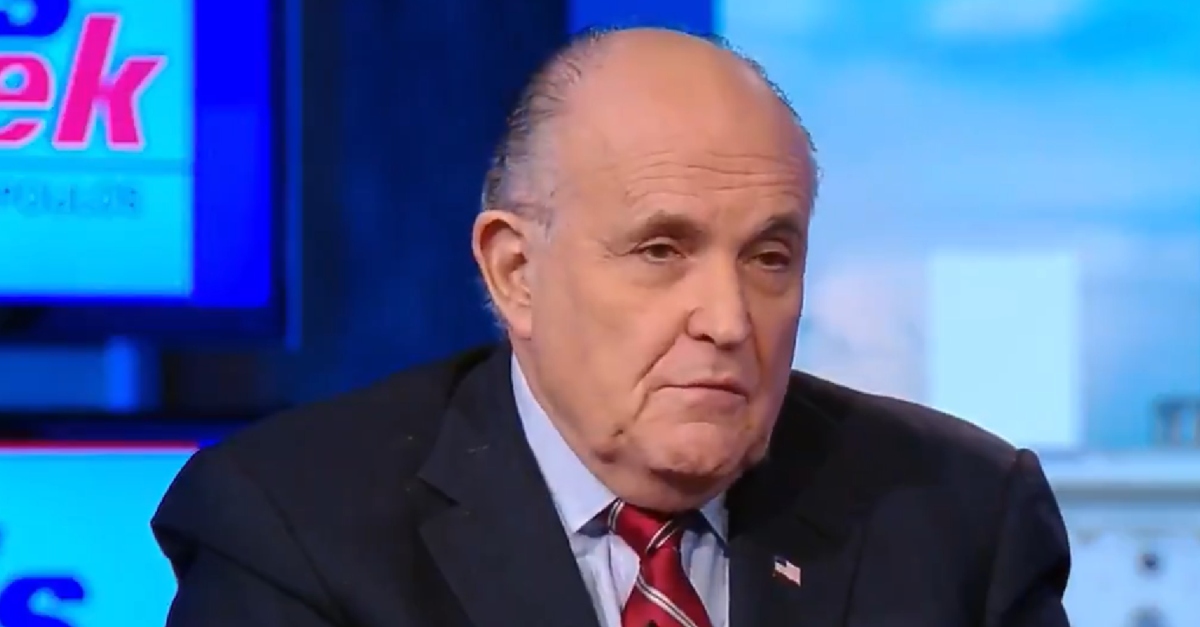
Rudy Giuliani‘s efforts to conduct shadow diplomacy in the Ukraine “while retaining unknown private clients” through his legal practice should be investigated by federal authorities due to potential conflicts of interest and ethical violations, according to a complaint filed late last week by a non-partisan government watchdog group.
On November 8, Campaign Legal Center (CLC) sent a 10-page letter to State Department Inspector General Steve Linick calling for the Office of Inspector General (OIG) to consider Giuliani a government employee “subject to conflict-of-interest laws.”
“If Giuliani met all elements of employee status while conducting work on behalf of President [Donald] Trump and the State Department, and it appears likely that he did, then [OIG] should also investigate whether Giuliani violated any conflict of interest laws,” under the federal statute on point, “and whether he should file a financial disclosure report,” the letter released Tuesday requests.
“Giuliani has been afforded the privilege and power of federal public service, but he has not been subject to the vital oversight and accountability provided by federal ethics laws,” said CLC Ethics Counsel Delaney Marsco, in a press release accompanying the letter. “Rudy Giuliani has asserted that his Ukraine work was done solely as a defense attorney for his client, Donald Trump, but the facts – and Giuliani’s own statements – show otherwise.”
CLC briefly sums up the overarching issue:
President Trump told Ukrainian president Volodymyr Zelensky to work directly with Giuliani on matters of U.S. foreign policy toward Ukraine—specifically, the investigations that were a precondition for Ukraine receiving taxpayer-funded aid from the U.S., and for Zelensky receiving an in-person White House meeting with President Trump. In addition, President Trump “directed Ambassador [Kurt] Volker, [Energy] Secretary [Rick] Perry, and [Ambassador to the European Union Gordon Sondland] . . . to discuss issues related to the President’s concerns about Ukraine” with Giuliani, according to Sondland’s sworn testimony before the U.S. House Committees on Intelligence, Oversight and Reform, and Foreign Affairs. Those U.S. officials “understood that satisfying Mr. Giuliani was a condition for scheduling the White House visit,” connected Giuliani with high-ranking Ukrainian officials, and deferred to Giuliani’s demands regarding the contents of a statement being negotiated by State Department officials with a foreign power.
“President Trump thus assigned Giuliani a formal foreign policy role within the administration,” the letter argues. “At the same time, Giuliani has continued to represent private clients, some of whom are Ukrainian, and many of whom are unknown to the public. The fact that Giuliani was conducting U.S. foreign policy while retaining unknown private clients whose interests could be affected by his government work raises serious questions of conflicts of interest.”
The letter notes that Giuliani currently represents the Ukrainian city of Kharkiv–a northwestern metropolis near the Russian border.
A Washington Post article from July 2018 describes the general composition of Giuliani’s ongoing Ukrainian legal work:
Among the clients represented by Giuliani’s consulting firm is the city of Kharkiv, Ukraine, whose mayor was a leading figure in the Party of Regions, the Russia-friendly political party at the center of the federal conspiracy prosecution of former Trump campaign chairman Paul Manafort. His firm worked for the mayor in 2018 and is expected to work for him again later this year, Giuliani said in an interview.
Kharkiv has contracted with a subsidiary of Giuliani’s consulting firm, Giuliani Partners, to help set up a new office of emergency management there, according to Giuliani and others involved in arranging the deal. Giuliani traveled to Ukraine in November to meet with Kharkiv officials and then hosted a delegation from the city in New York in March, about three weeks before he was hired as Trump’s attorney, according to officials and Ukrainian news reports.
CLC believes Giuliani was unofficially made an employee of the executive branch and that he was “constructively appointed to the civil service” by dint of his foreign policy efforts directing what Ambassador William Taylor, the chargé d’affaires for Ukraine, termed “an irregular policy channel” of “U.S. policy-making with respect to Ukraine,” according to Taylor’s recent congressional testimony.
Gordon Sondland’s own testimony confirmed that Trump “directed” Volker, Perry and himself to confer with Giuliani on Ukrainian issues and that a much-desired “White House visit for President Zelensky was conditioned upon President Zelensky’s agreement to make a public anti-corruption statement,” which would have implicated the family of 2020 presidential candidate and potential Trump foe Joe Biden.
“Ambassador Taylor further testified about Giuliani’s central role in conditioning an official meeting between Trump and Zelensky on pledges for political investigations,” the letter continues.
These efforts, CLC contends, effectively mean “Giuliani was engaged in the performance of a federal function under the authority of law” and fell under the “supervision of a federal officer or employee while engaged in the performance of the duties,” thus his work for Trump vis-à-vis the Ukraine should be viewed under the auspices of the requisite federal prohibitions related to conflicts of interest.
“President Trump assigned Giuliani a substantial foreign policy role, but at the same time, Giuliani continued to represent private clients, many of whom are not publicly known,” said CLC’s Director of Federal Reform, Brendan Fischer. “Giuliani’s prominent role on U.S-Ukraine policy issues means that he cannot sidestep the ethics obligations that require transparency behind the wealthy foreign or domestic interests that are paying him. We expect the agency Inspector General to take this matter seriously.”
[image via ABC News screengrab]